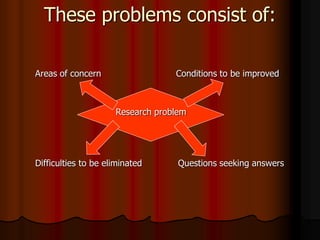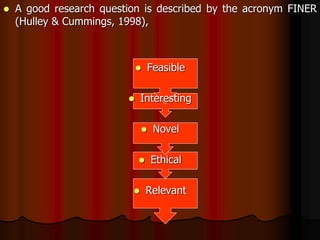This document discusses how to generate a research problem and formulate a research question. It explains that the research question is the most important part of a research proposal as it defines the research and guides the inquiry. The document provides guidance on developing a good research question, including that it should be feasible, interesting, novel, ethical, and relevant. It also describes different types of research questions such as those asking about existence, description, relationships, causality, and comparisons. Overall, the key aspects covered are identifying a research problem and narrowing it down to a specific research question.






![DEVELOPING THE RESEARCH QUESITON
Research Question is:
a statement that identifies the phenomenon to be studied
a formulation of uncertainty about science … that you wish to
explore or resolve [Hulley SB & Cumming SR, 1988]
• It should be the central question of a research,
• It is a problem that someone would like to investigate,
• It is considered a situation that needs to be changed or addressed,](https://image.slidesharecdn.com/researchproblem2-190829112206/85/Research-problem-7-320.jpg)





























